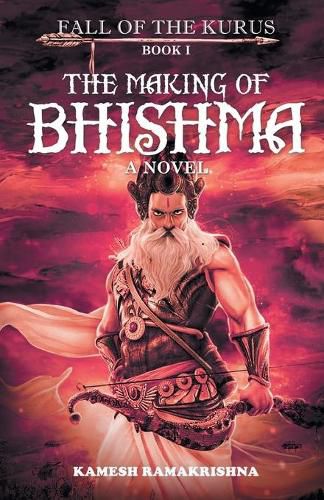Readings Newsletter
Become a Readings Member to make your shopping experience even easier.
Sign in or sign up for free!
You’re not far away from qualifying for FREE standard shipping within Australia
You’ve qualified for FREE standard shipping within Australia
The cart is loading…






This title is printed to order. This book may have been self-published. If so, we cannot guarantee the quality of the content. In the main most books will have gone through the editing process however some may not. We therefore suggest that you be aware of this before ordering this book. If in doubt check either the author or publisher’s details as we are unable to accept any returns unless they are faulty. Please contact us if you have any questions.
Book I: The Making of Bhishma, portrays the world of Hastinapura as its rulers try to manage the crisis. It explores the impact of this conflict on the life of Devavrata (Bhishma), eldest son of Shantanu, ruler of Hastinapura. His mother had committed suicide since the Kavi Sangha’s one-family-one-child policy has required her to sacrifice seven of her children. Subsequently, Devavrata is disinherited so Shantanu can marry Satyavati, who demands the Kavi Sangha policies not apply to her. In a moment of anger, Devavrata vows to remain celibate. On the death of his father, he and Satyavati are compelled to rule as co-Regents for her underage sons - Chitrangada and Vichitravirya. But Devavrata is unable to prevent Chitrangada’s murder by the invading Shakas. His subsequent actions to protect the borders of Hastinapura earn him the cognomen Bhishma (The Terrible). A secret love affair with Amba is cut short when she disappears. Vichitravirya dies just before his sons are born and Devavrata once again becomes co-Regent for his nephews, Dhritarashtra and Pandu. He narrates much of this story on his deathbed, as a prisoner of the sons of Pandu; other narrators fill in what he could not have known. At the end of his life, Devavrata muses over all that he gave up and left unmade in his own life while he built the Kuru Empire - an empire over which the Great War was fought.
$9.00 standard shipping within Australia
FREE standard shipping within Australia for orders over $100.00
Express & International shipping calculated at checkout
Stock availability can be subject to change without notice. We recommend calling the shop or contacting our online team to check availability of low stock items. Please see our Shopping Online page for more details.
This title is printed to order. This book may have been self-published. If so, we cannot guarantee the quality of the content. In the main most books will have gone through the editing process however some may not. We therefore suggest that you be aware of this before ordering this book. If in doubt check either the author or publisher’s details as we are unable to accept any returns unless they are faulty. Please contact us if you have any questions.
Book I: The Making of Bhishma, portrays the world of Hastinapura as its rulers try to manage the crisis. It explores the impact of this conflict on the life of Devavrata (Bhishma), eldest son of Shantanu, ruler of Hastinapura. His mother had committed suicide since the Kavi Sangha’s one-family-one-child policy has required her to sacrifice seven of her children. Subsequently, Devavrata is disinherited so Shantanu can marry Satyavati, who demands the Kavi Sangha policies not apply to her. In a moment of anger, Devavrata vows to remain celibate. On the death of his father, he and Satyavati are compelled to rule as co-Regents for her underage sons - Chitrangada and Vichitravirya. But Devavrata is unable to prevent Chitrangada’s murder by the invading Shakas. His subsequent actions to protect the borders of Hastinapura earn him the cognomen Bhishma (The Terrible). A secret love affair with Amba is cut short when she disappears. Vichitravirya dies just before his sons are born and Devavrata once again becomes co-Regent for his nephews, Dhritarashtra and Pandu. He narrates much of this story on his deathbed, as a prisoner of the sons of Pandu; other narrators fill in what he could not have known. At the end of his life, Devavrata muses over all that he gave up and left unmade in his own life while he built the Kuru Empire - an empire over which the Great War was fought.